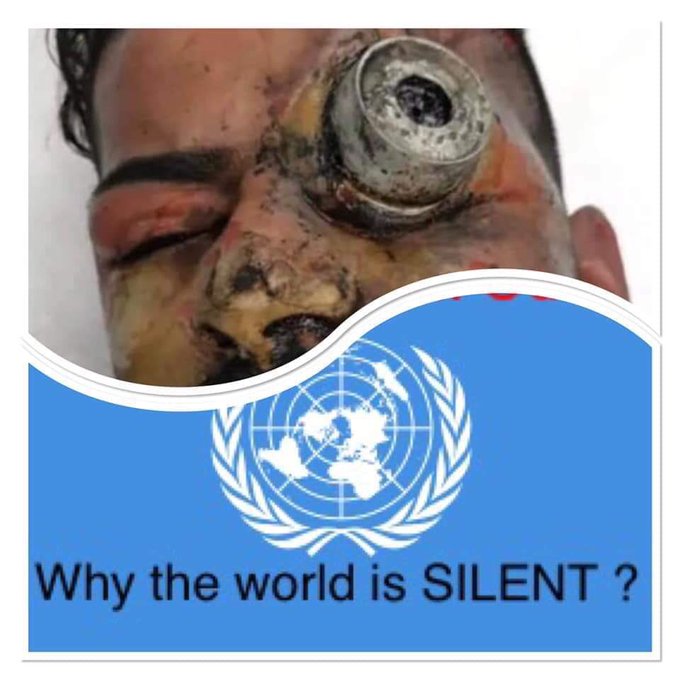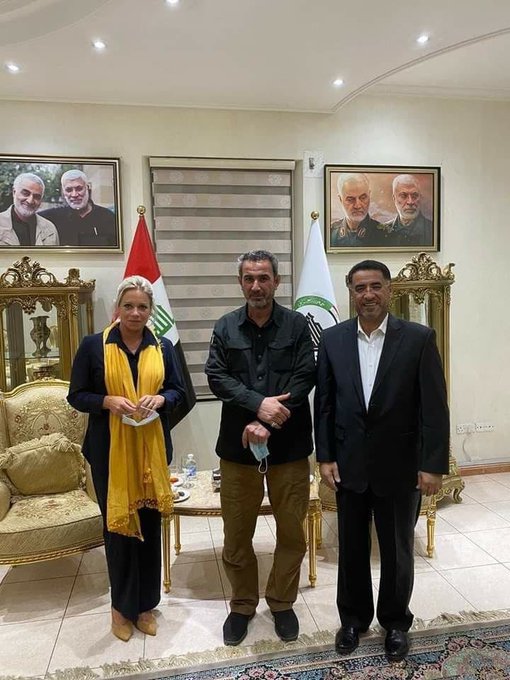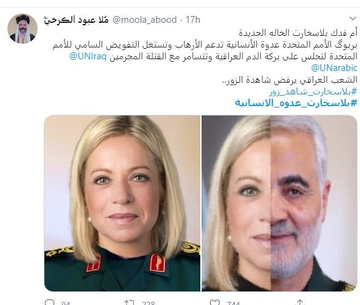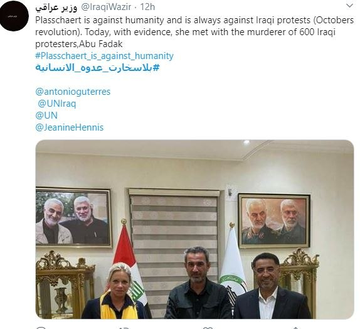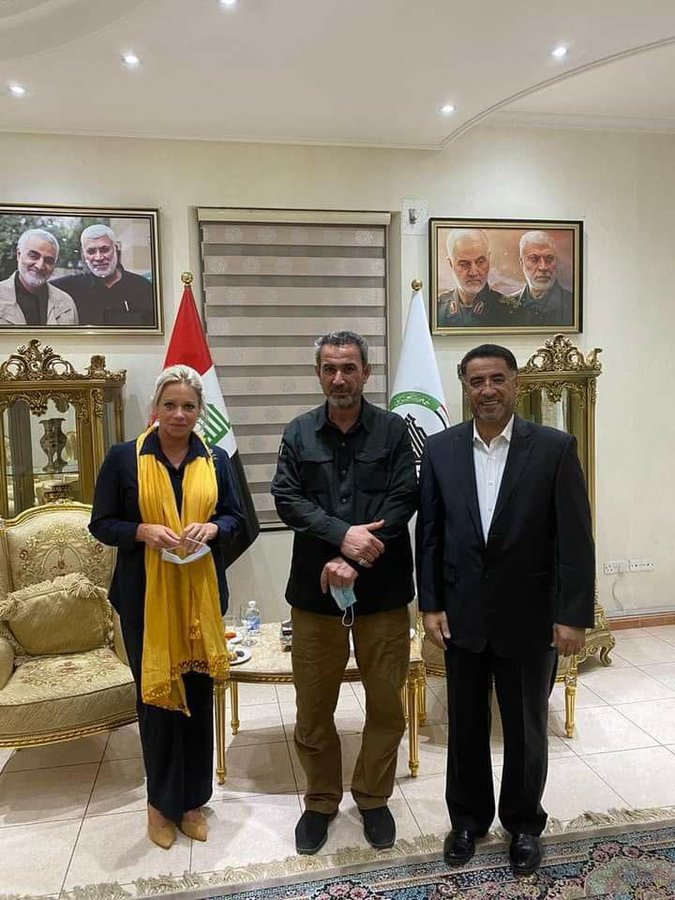In the span of 30 seconds, Ali Jasb, a young rights lawyer, vanished into the night in southern Iraq.
On an evening a year ago, a woman emerged from a dimly lit street in the city of Amara, her face hidden in a black abaya, and greeted Jasb. Almost immediately a black SUV pulled up, two men forced him in and sped away. The woman climbed into a waiting pickup truck and left.
That last sighting of the 21-year-old Jasb was captured by a surveillance camera at 6:22 p.m. on Oct. 8, 2019. Nothing has been heard from him or his captors.
Ever since, Jasb’s father has been on a search for justice that has run repeatedly against one major obstacle: the increasing helplessness of Iraq’s government in the face of powerful, Iranian-backed Shiite militias.
That's the opening of Samya Kullab's "In Iraq a father faces militia power as he seeks missing son" (AP). And the news is completely predictable. The actions the militias in Iraq take today are the same ones they took years prior. They were out of control and there was never a logical reason to believe that if they were incorporated into the Iraqi forces that they would suddenly be in control. They're criminals, that's what they were and that's what they are.
Being unwilling and unable to stand up to them, the government made the militias part of the government. You'd have to be an idiot -- or THE NEW YORK TIMES (redundant?) -- to believe that you could 'chip away' (NYT's term in 2019) at the 'militia's independence' by making them a part of the government. Nouri al-Maliki had long proposed this action during his second term as prime minister but it took someone even worse than Nouri to pull it off: Hayder al-Abadi. TIME named Hayder on eof the 100 most influential people in the world -- reminding everyone that an 'influence' can be good or bad.
One of the few to call the militia nonsense out in real time was Ranj Alaaldin (Brookings) who observed:
But such beliefs were met with a new reality on Monday, as were (unrealistic) hopes that al-Abadi could rebuild Iraq and bring the country together: His coalition announced that he will join forces with Iran-aligned militias that spear the Popular Mobilization Forces (PMF), the umbrella Shiite militia organization established in 2014 to fill the vacuum that was left by the collapse of Iraq’s armed forces when ISIS seized Mosul.
Just a day later, the Iran-aligned militias—contesting the elections as the al-Fatih (Conquest) bloc—withdrew from the electoral alliance, not out of principle but because of differences over participation and electoral strategy (there were not enough seats to go around). Indeed, Hadi al-Ameri, the head of the Badr Brigade—Iraq’s most powerful militia, which Iran established in the 1980s and which controls the Interior Ministry—has even hinted they could join forces after the elections to form a government.
Bringing them into the government did not put any controls on the militias. They terrorize the Iraqi people as they did before they were part of the government. They refuse to take orders and they issue threats against the Iraqi government.
Last July at The Atlantic Council, C. Anthony Pfaff offered:
The July 6 assassination of Hisham al Hashimi, a well-known political analyst who criticized Iraq’s sectarian politics, represented the loss of someone who made meaningful contributions to Iraq’s recovery and reconciliation efforts. Hashimi’s death also represented an escalation that threatens to bring back the gang-like violence Iraq experienced from 2004 to 2008.
No one has claimed responsibility for Hashimi’s murder. Many suspect Kitaib Hizballah (KH), a militia which is part of the Popular Mobilization Forces (PMF) backed by Iran. Hashimi was critical of KH and they reportedly sent him death threats just prior to his killing. Such murders of course, are not out of character for KH or any of Iran’s proxies in Iraq. They, along with Sunni extremists, were responsible for killing thousands of Iraqis during the years of sectarian conflict. More recently, these militias were responsible for killing, kidnapping, and torturing protesters, who objected, in-part, to Iran’s pervasive and malign influence in Iraq.
In Hashimi’s case, there is additional context that makes KH’s responsibility for his death plausible. Hashimi was supportive of Iraqi Prime Minister Mustafa Kadhimi, who in June had ordered members of KH detained. It should not be surprising then that many are taking Hashimi’s assassination as a message to Kadhimi: Stop interfering with the militias and their criminal operations.
The difficulty for Kadhimi is that even a strong suspicion of KH culpability is not enough to make further escalation against the militia appear legitimate to the Iraqi people. In fact, KH was not only able to get all their members arrested in the June raid released in 24 hours, they made a public show of welcoming them back publicly as heroes while burning American flags and tramping on images of Kadhimi. Further, it is important to remember that while the case against KH may seem compelling from the outside, it is not so from the inside. Hashimi was an outspoken critic of a range of Iraqi actors and had an extensive list of enemies. Thus, any moves Kadhimi makes against any suspected group without resolving uncertainty regarding their responsibility in a way the Iraqi public will accept will almost certainly escalate the violence.
Having said that, Hashimi’s assassination may provide Kadhimi with an opportunity to act. As the protests have illustrated, Iraqis are unhappy with the militias and Iran’s interference. The prospect of another sectarian war will only make them more unpopular. If Kadhimi does act against the militias, eliminating or constraining one—even one as powerful as KH—will not do much good. As in any other gang-like environment, others will fill the space left behind by the demise of one.
At Carnegie Endowment for International Peace, Tamer Badawi argued last month:
Kadhimi came into office with the intention to crackdown on paramilitaries. He has incrementally increased pressure on them using coercion, among other means. However, the targeted paramilitaries lashed back using force, and other staunchly pro-Iran paramilitaries increased their rhetorical attacks on Kadhimi’s government through their affiliated media and television channels. For example, on June 25, the U.S.-trained Iraqi Counter Terrorism Force (ICTS) raided a PMF facility in Baghdad belonging to the 45th brigade controlled by Kata’ib Hezbollah (KH), a top-tier paramilitary allied with Iran. The ICTS arrested fourteen of the paramilitary’s personnel suspected of involvement in the launching of projectiles at the Green Zone. KH retaliated to the raid by sending forces to lay siege over the main ICTS headquarters and another ICTS facility within the Green Zone.[2] The vast majority of Kadhimi’s administration believes that KH was responsible for launching rockets prior and during the Iraq-U.S. Strategic Dialogue with the aim of embarrassing him, and of putting pressure on the United States to withdraw troops. To a segment of domestic and international audiences, Kadhimi’s succumb to pressure from KH constituted a major setback.
Prime Minister al-Kadhimi is attempting to counter the paramilitaries on multiple fronts. Financially, he sought to strengthen government control over border crossings to fight corruption and smuggling. Border crossings are used by paramilitaries, including those reportedly active at Diyala’s border crossing into Iran. If the government effectively controls these vital channels, financial inflows from smuggling will decrease in the long term. During a visit, Kadhimi sent the PMF and the Rapid Deployment Forces to take over the two border crossings at Diyala into Iran, according to the Joint Operations Command (JOC). Subsequently, on July 25, the JOC dedicated forces to control fourteen overland and sea port border crossings. Furthermore, to limit the opportunity for corruption, Kadhimi shortened the rotation of border crossing employees from six to three months.[3] However, unofficial border crossings that are designed to dodge government oversight exist and tend to generate greater revenues for paramilitaries than the official crossings,[4] but Kadhimi has not previously cracked down on them. In August, the prime minister formed a committee to “investigate corruption and major cases” and assigned the ICTS to execute its orders, in an effort to further curtail the paramilitaries’ income sources.
Mustafa al-Kadhimi appears to 'try' to do many things. Actually achieving anything, thus far, remains beyond his grasp. The militias are part of the Iraqi forces that have been attacking the protesters. MEMO notes:
Amnesty International yesterday called on the Iraqi government to ensure justice is served for hundreds of protesters who have been killed or forcibly disappeared during the country’s anti-government protests that erupted a year ago.
“The Iraqi government must step up its efforts to deliver justice to the hundreds killed in the course of exercising their right to peaceful assembly. Find the missing, deliver justice for lives lost!” the rights watchdog said on Twitter, adding that last year thousands of protesters in Iraq took to the streets “demanding better living conditions and an end to corruption. Security forces responded with killing protesters, while dozens of activists are still being hunted down and killed to this day.”
The Iraqi authorities’ promises to achieve justice for the victims, Amnesty continued, was “nothing but ink on paper”, as gunmen continue to target activists and demonstrators with impunity.
Earlier yesterday, thousands of protesters gathered in public squares in Baghdad and several other governorates, to commemorate the first anniversary of the popular protests that swept the country for months leaving hundreds dead and thousands injured.
Meanwhile the United Nations mission in Iraq is being criticized for their meeting with the head of a militia. Omar & IGI Tweets:
# Iraq - The UN mission defends the meeting of the representative of the Secretary-General of the United Nations with the deputy head of the Popular Mobilization Militia (dialogue with terrorist militias is the solution)
The following sites updated:

